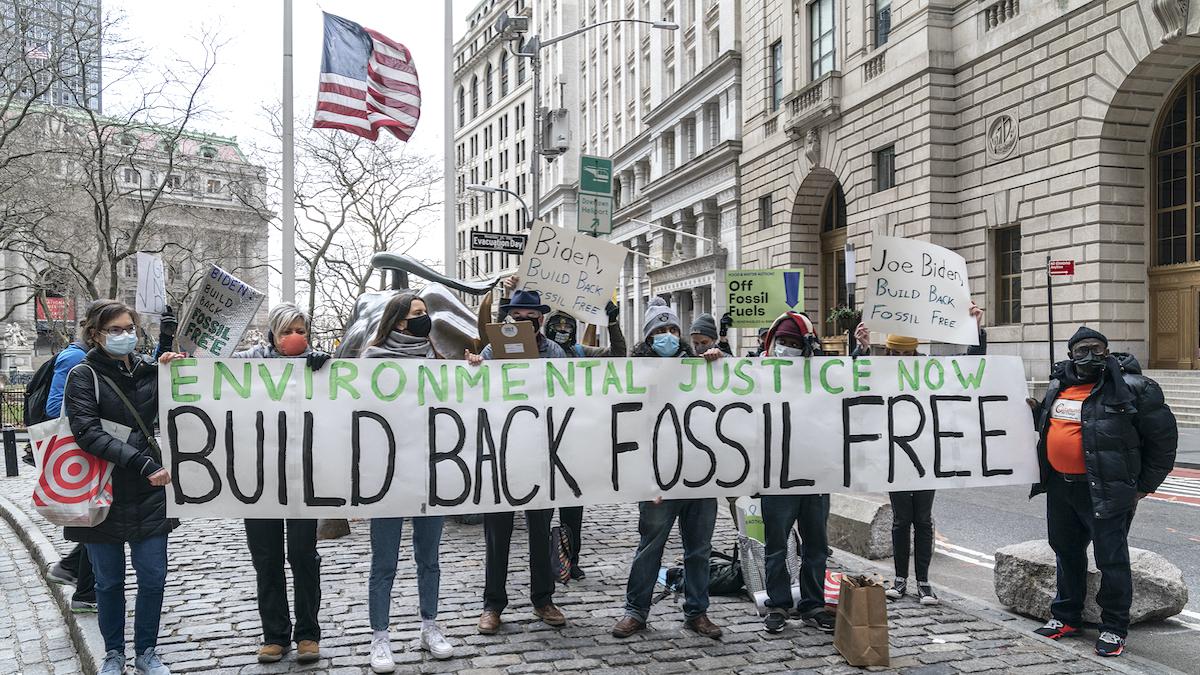
As Kerry Touts U.S. Climate Diplomacy, Biden Is Urged to End Dirty Energy Subsidies

Activists rally on Jan. 19, 2021 in New York City to demand that U.S. President Joe Biden take immediate executive action to "Build Back Fossil Free." Lev Radin / Pacific Press / LightRocket via Getty Images
By Kenny Stancil
While President Joe Biden’s top climate envoy John Kerry told world leaders at a virtual climate summit that the U.S. will fulfill its commitment to provide financial support to developing countries as they grapple with the deadly consequences of a warming planet, campaigners are urging the U.S. to follow the lead of European Union officials who on Monday pledged to stop subsidizing fossil fuels and instead invest in a just transition toward clean energy.
“Ending government support for fossil fuels is a no-brainer,” Laurie van der Burg of Oil Change International said Monday in a statement responding to the EU’s newly stated commitment to phasing out dirty energy subsidies and helping to fund a global push toward renewable energy. “Globally, governments are still propping up fossil fuels with huge sums of public money, behavior that is incompatible with keeping global warming below 1.5ºC.”
Oil Change International’s Collin Rees said that “today’s commitment by the EU to end overseas investment in oil, gas, and coal projects is yet another indication that the fossil fuel era is over. As a new administration takes power in Washington, this is a powerful signal that clean energy is ascendant and that the EU stands willing to work with President Biden and others to end all finance for dirty energy.”
Noting that Biden “has committed to end fossil fuel subsidies and dirty energy finance,” van der Burg pointed out that the UK in December “announced an end to their overseas public finance for fossil fuel.”
According to van der Burg, “This creates a powerful opportunity for the EU, UK, and U.S. to collaborate to finally end government-backed finance for oil, gas, and coal ahead of the UK-hosted UN climate summit in November.”
Rees argued that “Biden should act boldly on his campaign commitments to end finance for dirty energy projects.”
“By building on past commitments to end coal finance and extending this to oil and gas,” Rees added, “Biden can join the EU and UK in transforming international finance to address the challenges of the next century, not prop up the remnants of the last century’s infrastructure.”
Speaking at the Netherlands-hosted Climate Adaptation Summit just days after Biden issued an executive order re-entering the 2015 Paris agreement — the emissions reduction treaty the country had abandoned under former President Donald Trump — Kerry said the U.S. “was ‘proud to be back’ in the global climate discussion,” Reuters reported Monday.
“We intend to make good on our climate finance pledge,” Kerry said. According to Reuters, the U.S. “has delivered only billion of the billion it pledged under former President Barack Obama to the UN Green Climate Fund, set up to help vulnerable countries transition to clean energy and adapt to a warmer future.”
Three billion dollars is a tiny fraction of what impoverished countries will need to shield their populations from the risks of heatwaves, droughts, fires, floods, and other disasters that have intensified as a result of global warming.
According to a UN report published earlier this month, developing countries alone will need to spend roughly billion per year to combat the climate crisis, and those annual costs could surge to 0 billion to 0 billion by 2030 and 0 billion to 0 billion by 2050.
Kerry said the Biden administration “also intends to make significant investments in climate action” in the U.S. and abroad, Reuters reported. “He did not give details about those investments, but promised Washington would soon announce a new target for reducing U.S. greenhouse gas emissions that ‘meets the urgency of the challenge.'”
Given that the world’s most vulnerable people who have done the least to contribute to the climate emergency are likely to bear the brunt of the damage unless drastic steps are taken to transform society, as well as the disproportionate role played by rich nations — and especially the wealthy classes within them — in causing the crisis, climate justice advocates have called on affluent countries that are capable of doing more to step up.
Van der Burg emphasized the importance of wealthy nations taking action domestically — not just in the international arena of climate finance — to drastically reduce emissions and address the root causes of climate disruption.
Although referring specifically to the EU, her message applies as well to the UK and the U.S.: “For effective diplomacy on this issue, the EU must take action at home, and close loopholes for continued EU support for fossil fuels, including for gas,” she said. “For the EU to lead this agenda at the international level, it must set the right example and phase out all government support for fossil fuels.”
In a letter to Kerry and other world leaders ahead of Monday’s climate summit, a group of 3,000 scientists warned that if governments fail to adequately invest in climate change mitigation and adaptation now, “the results will be increasing poverty, water shortages, agricultural losses, and soaring levels of migration with an enormous toll on human life.”
Reposted with permission from Common Dreams.
- 145 Progressive Groups Urge Biden to Shun Fossil Fuel Execs and ...
- World Mayors Call for Car-Free Streets, End to Fossil Fuel Subsidies ...

 233k
233k  41k
41k  Subscribe
Subscribe 